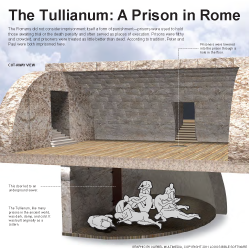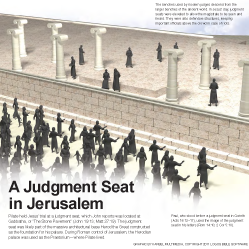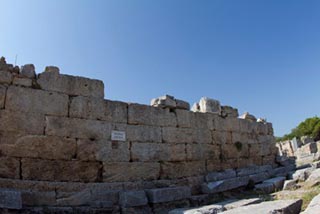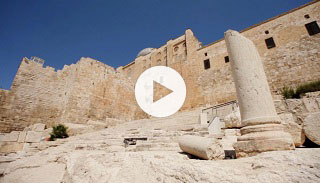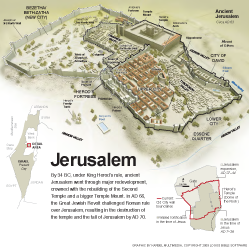12:1–19 Luke (the narrator) tells the story of James’ death and Peter’s imprisonment at the hands of Herod Agrippa I, a grandson of Herod the Great. In doing so, Luke illustrates that, in spite of opposition, no earthly king can succeed for long in hindering the kingdom of Jesus. |
12:1 Herod This is not the same Herod as in Jesus’ day (Herod the Great; Matt 2:3,19). This is Herod Agrippa I, a grandson of Herod the Great. In ad 37 he was given the territory of Philip the tetrarch (see Luke 3:1). He added Galilee and Perea in ad 39 and the rest of Judaea two years later, reigning over all of them for just three years. Later in Acts, Paul encounters his son Agrippa II (Acts 25:13–26:32).
 Political Leaders in the New Testament Table
Political Leaders in the New Testament Table
12:2 James The brother of John and son of Zebedee (Mark 3:17; Acts 1:13), not the brother of Jesus (see v. 17).
sword This type of execution may signify that Agrippa I considered the growth and mission of the Christian community to be not just a religious but a political threat.
12:3 it was pleasing to the Jews According to the first-century Jewish historian Josephus, Agrippa I enjoyed a good relationship with the Jewish people (Josephus, Antiquities 19.328–31). Agrippa I may have seen persecution of Christians as an opportunity to further improve his relationship with the Jewish people (compare 9:1).
feast of Unleavened Bread This Jewish feast took place for seven days every spring in conjunction with Passover (Exod 12:14–20; 23:15; compare Luke 22:1).
12:4 prison Compare Acts 5:18.
12:6 between two soldiers Two of the soldiers in the squad are chained to Peter while the other two keep watch. This choice to guard him this closely is probably due to him being freed miraculously earlier (5:17–26).
striking The Greek word used here suggests a forceful blow (compare Luke 22:49–50; Acts 7:24)—which, ironically, an angel will deal to Agrippa I as well (v. 23)—although in Peter’s case, it is for his deliverance.
 Angels in the Bible Table
Angels in the Bible Table
Get up quickly The detailed series of instructions the angel must give Peter may anticipate the information revealed afterward that Peter was in some sort of daze (see vv. 8–11).
12:11 came to himself Peter finally realized that his dream was real (compare note on v. 7).
the Jewish people This is not a reference primarily to Jews as opposed to Gentiles (non-Jewish people), but to Jews who have rejected Jesus as Messiah and are opposed to the Christian community and its mission.
12:12 Mark Also known as John Mark. A missionary companion to Paul and Barnabas (vv. 25; 15:37), who seems to have been Barnabas’ cousin (Col 4:10) to whom the early church ascribed the authorship of the Gospel of Mark.
12:13 slave The Greek word used here, paidiskē, always refers to slaves in the nt (e.g., Luke 22:56; Acts 16:16). This means Rhoda was a household slave.
12:14 her joy Humorously, Rhoda is so overjoyed to realize Peter is alive and has escaped that she forgets to let him in. Since Rhoda responds with joy at Peter’s arrival, she is likely a Christian.
12:15 You are out of your mind The church had been praying fervently for Peter’s release (vv. 5, 12). They were not anticipating their prayers to be answered in such a remarkable way.
angel The Greek word used here is not phantasma, the typical Greek word for ghost used elsewhere in the nt (Matt 14:26; Mark 6:49) and in other ancient Greek literature. Instead the Greek word used is angelos, which is used to describe a heavenly being sent from Yahweh or a messenger. The church’s reaction likely testifies to an ancient belief that one’s angel was a kind of celestial entity that accompanied a person for his or her welfare (compare Matt 18:10; Heb 1:14).
12:17 James This James is the brother of Jesus, and the early church ascribed the authorship of the book of James to him. He seems to have been prominent in the Jerusalem church leadership (compare Acts 15:13).
12:18 not a little commotion The Greek phrase used here is known as a litotes—a figure of speech that states facts conservatively for effect. The point is that there was a great commotion.
12:19 led away to execution Allowing a prisoner to escape was a crime punishable by death.
12:20–25 The narration of the work of the early church is interrupted by a narrative about Herod Agrippa I (see note on v. 1). This is for the purpose of showing how the persecution of Agrippa I subsided. |
12:20 Tyrians and Sidonians Important cities in Phoenicia on the Mediterranean coast. It may be that Herod (Agrippa I) was in some sort of economic struggle with the cities and had applied sanctions against them, affecting their food supply.
12:21 royal clothing According to the ancient Jewish historian Josephus, who offers a parallel account of this story (Josephus, Antiquities 19.344), Herod’s robes on this occasion were made of silver and sparkled in the sunlight.
on the judgment seat The official bench where a ruler would evaluate a judicial case or examine and reward an athlete. The reference suggests Herod may have been in the hippodrome of Caesarea.
12:22 voice of a god Perhaps to regain Herod’s favor, the people flatter him.
 Pagan Deities in the New Testament Table
Pagan Deities in the New Testament Table
12:23 immediately God, who will not share His glory with any other (e.g., Isa 42:8; Ezek 28:2, 6), acts without delay to judge Herod for accepting divine honor and praise for himself. Compare note on Acts 12:7.
was eaten by worms The nature of this disease is uncertain, but its effect is to judge Herod (Agrippa I) for his pride and to prove that he was certainly no god.
12:24 word of God In contrast to the speech of Herod that brought on his destruction, the word of the true God—that is, the proclamation of Jesus’ death and resurrection for the forgiveness of sins and new life in the Spirit—continues to grow and spread.
12:25 completed their service Paul and Barnabas had been sent from Antioch to Jerusalem to bring a famine relief offering (11:29–30), and now returned to Antioch with John Mark (see v. 12 and note).

|
About Faithlife Study BibleFaithlife Study Bible (FSB) is your guide to the ancient world of the Old and New Testaments, with study notes and articles that draw from a wide range of academic research. FSB helps you learn how to think about interpretation methods and issues so that you can gain a deeper understanding of the text. |
| Copyright |
Copyright 2012 Logos Bible Software. |
| Support Info | fsb |
 Loading…
Loading…
